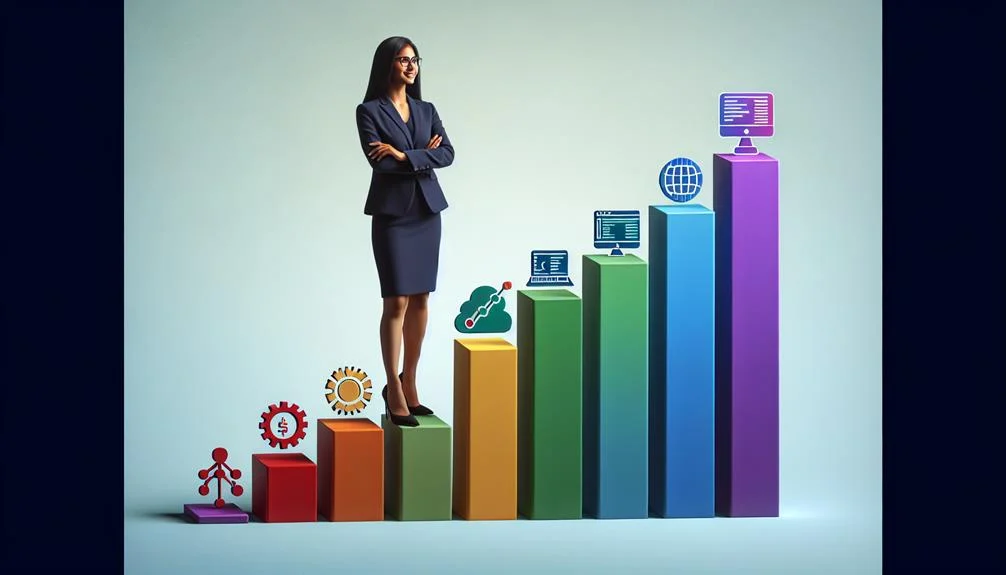Computer science is a broad field focusing on the study and application of computers and computational systems. It encompasses critical components such as theoretical foundations, hardware and software design, algorithm creation, and data management. This discipline is vital in fields like artificial intelligence, software development, and bioinformatics. As you further explore this subject, you’ll grasp how computer science shapes technological innovation and societal transformation.
- Computer science is an interdisciplinary field that focuses on computers and their practical applications.
- It involves studying theoretical foundations, hardware/software design, algorithm development, and information management.
- It plays a vital role in various sectors, from healthcare and finance to entertainment, by improving efficiency and redefining user experiences.
- Careers in computer science include software development, network administration, and AI engineering, with competitive salaries and strong job growth projections.
- Essential skills for this field include problem-solving, proficiency in programming languages like Python and Java, and project management abilities.
Understanding Computer Science
Computer science, an interdisciplinary field of study, focus on the intricate details of computers and their wide-ranging practical applications. This all-encompassing field emphasizes the theoretical foundations of computing, from the design of hardware and software to the development of algorithms and the management of information. Its scope extends to the automation of various processes, harnessing the power of artificial intelligence (AI) to create solutions for complex problems.
The industry applications of computer science are vast and continually expanding. AI has found uses in diverse sectors such as automotive, retail, healthcare, manufacturing, robotics, computer vision, and natural language processing (NLP). Professionals in computer science are at the forefront of these advancements, developing algorithms, designing software systems, and optimizing computational processes.
Yet, understanding computer science is not only integral for those directly involved in its study and application. Its principles and methods have become crucial knowledge for careers in a variety of technology-related fields. From software development to data analysis and cybersecurity, the influence of computer science permeates numerous professions, underscoring its essential role in our technology-driven world.
Technologies Used in Computer Science
In computer science, an array of cutting-edge technologies are utilized to innovate and advance various fields. Artificial Intelligence (AI) and Machine Learning (ML) are pivotal, driving advancements in data analysis, pattern recognition, and automation. Quantum Computing stands at the forefront, promising exponential leaps in computational power with its ability to handle complex algorithms.
Blockchain technology ensures secure and transparent transactions, particularly in the realm of cryptocurrencies. Edge Computing and Cloud Computing play integral roles, enabling efficient data processing and storage, while the Internet of Things (IoT) interconnects devices for seamless data exchange and interaction. These technologies collectively drive innovation, revolutionizing industries and shaping the future landscape of computing.
List of Technologies Used in Computer Science
- Artificial Intelligence (AI): Utilized for creating intelligent systems that can mimic human behavior and perform tasks.
- Machine Learning (ML): A subset of AI focusing on algorithms that allow computers to learn from and make predictions based on data.
- Robotics: Involves the design, construction, and programming of robots to perform tasks autonomously or with human interaction.
- 5G Networks: Next-generation mobile networks with faster data transfer speeds, lower latency, and increased capacity.
- Automation: Techniques for making systems operate automatically without human intervention, often using scripts or software.
- Cybersecurity: Measures to protect computer systems, networks, and data from unauthorized access, cyberattacks, or damage.
- Quantum Computing: Utilizes quantum phenomena like superposition and entanglement to perform computations, potentially solving complex problems much faster than classical computers.
- Blockchain Technology: A distributed ledger technology used for secure and transparent transactions, particularly in cryptocurrencies like Bitcoin.
- Internet of Things (IoT): Interconnected devices embedded with sensors, software, and other technologies to exchange data and perform actions.
- Biometrics: Techniques for measuring and analyzing unique biological characteristics for purposes like authentication and identification.
System Design in Computer Science
System Design in computer science refers to the process of defining the architecture, components, modules, interfaces, and data for a system to satisfy specified requirements. This comprehensive process involves:
- Architecture Definition: Designing the overall structure of the system, ensuring that all components fit together to meet the system’s objectives.
- Component Specification: Identifying and detailing each part of the system, including hardware, software, and their interactions.
- Module Design: Breaking down the system into smaller, manageable pieces or modules, each with a specific function.
- Interface Design: Creating the points of interaction between different modules or components, ensuring seamless communication.
- Data Design: Structuring the data used by the system, including databases, data flow, and data storage solutions.
System Design is crucial because it ensures that complex systems are built in an organized, efficient, and scalable manner, allowing them to meet current and future requirements effectively
Data Science in Computer Science
Data science plays a pivotal role in computer science by harnessing large datasets to derive insights, make predictions, and solve complex problems. In computer science, data science techniques are applied in various domains such as machine learning, artificial intelligence, and cybersecurity. Data scientists utilize algorithms, statistical methods, and programming languages to analyze data, extract meaningful patterns, and develop predictive models.
Data science enables computer scientists to optimize software performance, enhance user experiences, and make data-driven decisions in software development processes. By leveraging data science techniques, computer scientists can efficiently manage and process vast amounts of data, leading to innovative solutions and advancements across diverse fields within computer science.
Data Structures in Computer Science
Data structures are fundamental components of computer science, extensively utilized to organize and manage data efficiently.
Here’s how they are employed:
1 Optimized Data Storage: Data structures like arrays, linked lists, and trees enable the efficient storage and retrieval of information, essential for various computational tasks.
2 Algorithm Design: Data structures serve as the building blocks for designing algorithms. They facilitate the development of efficient algorithms for searching, sorting, and manipulating data.
3 Real-time Applications: In real-world scenarios, data structures are employed in applications like databases, operating systems, and network protocols to manage and process data effectively.
4 Memory Management: Data structures play a crucial role in memory management, ensuring optimal utilization of memory resources and minimizing overhead.
5 Problem-solving: By selecting appropriate data structures, computer scientists can devise efficient solutions to complex problems, improving the overall performance and scalability of software systems.
6 Data structures form the backbone of computer science, enabling the development of robust algorithms and efficient software solutions across various domains.
Artificial intelligence in Computer Science
Artificial intelligence (AI) is extensively utilized in various domains within computer science, contributing to advancements in technology and problem-solving capabilities.
Here’s how AI is employed:
- Data Analysis: AI algorithms are employed to analyze vast amounts of data, extracting valuable insights and patterns that aid in decision-making processes.
- Machine Learning: AI techniques, particularly machine learning, enable computers to learn from data, make predictions, and adapt to new situations without explicit programming.
- Natural Language Processing (NLP): AI-powered NLP algorithms are employed to understand and generate human language, enabling applications such as language translation, sentiment analysis, and chatbots.
- Computer Vision: AI algorithms for computer vision enable computers to interpret and analyze visual information from images or videos, facilitating applications like object recognition, image classification, and autonomous vehicles.
- Robotics: AI plays a crucial role in robotics, enabling machines to perceive their environment, make decisions, and perform tasks autonomously or with human interaction.
- Expert Systems: AI-based expert systems are developed to mimic human decision-making in specific domains, providing valuable insights and recommendations.
AI revolutionizes computer science by enhancing computational capabilities, enabling machines to perform tasks traditionally requiring human intelligence.
Algorithms in Computer Science
Algorithms are pivotal in computer science, serving as the foundational principles for problem-solving and computational tasks. These algorithms are utilized across various domains within computer science to devise efficient and effective solutions. Whether it’s developing software programs, optimizing processes, or analyzing data, algorithms play a crucial role. They provide step-by-step instructions or procedures to tackle well-defined computational problems, aiding in the formulation of plans and strategies for resolving complex issues.
Algorithms contribute to the understanding and analysis of computational complexity, essential for evaluating the performance and scalability of computer systems and programs. In essence, algorithms are the backbone of computer science, driving innovation and advancement in the field.
- Problem Solving: Algorithms are fundamental to computer science as they provide systematic approaches to solving various computational problems.
- Efficiency Optimization: They are used to optimize the efficiency of processes and systems by finding the most efficient ways to execute tasks and utilize resources.
- Data Processing: Algorithms are applied in data processing tasks such as sorting, searching, and analyzing large datasets, enabling efficient data manipulation.
- Plan Formulation: In computer science, algorithms are akin to plans or step-by-step instructions designed to solve specific problems.
- Mathematical Operations: They are widely used in mathematical computations and operations, contributing to various fields within computer science.
- Complexity Analysis: Understanding algorithmic complexity is crucial for analyzing the performance and scalability of computer programs and systems.
Ethical and Privacy Issues in Computer Science
Ethical issues in computer science are multifaceted, spanning various domains and technologies. One prominent concern is privacy, issues such as data breaches, unauthorized access to personal information, and surveillance. For instance, the misuse of personal data collected by social media platforms or corporations raises questions about consent, transparency, and individual rights. Additionally, the proliferation of artificial intelligence (AI) introduces ethical dilemmas related to algorithmic bias, where AI systems perpetuate discrimination based on race, gender, or other characteristics .
Computer science raises ethical concerns regarding accountability and responsibility. As technology becomes increasingly integrated into various aspects of society, questions arise about who should be held responsible for the consequences of technology failures or errors. Issues like intellectual property rights, cybersecurity ethics, and the societal impacts of automation and job displacement pose ethical challenges that require careful consideration and ethical frameworks to mitigate risks and ensure responsible technological advancement.
Some examples of these ethical issues are:
- Privacy Concerns: Collection and use of personal data without consent, leading to potential misuse or unauthorized access.
- Data Security: Inadequate protection of sensitive information, resulting in data breaches and cyber attacks.
- Intellectual Property Rights: Violation of copyrights or patents, especially in software development and digital content creation.
- Access Equality: Unequal access to technology and digital resources, exacerbating societal disparities.
- Algorithmic Bias: Biased algorithms perpetuating discrimination based on race, gender, or other attributes.
These ethical dilemmas require careful consideration and ethical frameworks to ensure responsible and equitable use of technology in society.
Computer Science in Real World Applications
How computer science is utilized in logistics
- Route Optimization: Computer algorithms analyze various factors such as traffic patterns, delivery schedules, and vehicle capacities to optimize routes, minimizing fuel consumption and delivery times.
- Inventory Management: Advanced software systems use data analytics and machine learning algorithms to forecast demand, optimize stock levels, and prevent overstocking or stockouts, improving inventory turnover and reducing costs.
- Warehouse Automation: Robotics and computer vision systems automate warehouse operations, including picking, packing, and sorting tasks, enhancing efficiency, accuracy, and throughput.
- Predictive Maintenance: Machine learning models analyze equipment data to predict maintenance needs and prevent breakdowns, reducing downtime and maintenance costs.
- Demand Forecasting: Algorithms analyze historical data, market trends, and external factors to forecast future demand accurately, enabling businesses to optimize production and distribution strategies.
- Real-time Tracking: GPS technology, combined with data analytics, enables real-time tracking of shipments, providing visibility into the supply chain and allowing proactive problem-solving.
How computer science is utilized in finance
- Algorithmic Trading: Computer science algorithms are used to execute large trades at optimal prices, leveraging mathematical models and data analysis to make split-second trading decisions.
- Quantitative Analysis: Computer science techniques such as statistical modeling, data mining, and machine learning are applied to analyze financial data, identify patterns, and make informed investment decisions.
- Financial Technology (FinTech): Computer science plays a crucial role in developing innovative financial products and services, including mobile banking apps, online payment systems, and blockchain technology.
- Risk Management: Computational methods are used to assess and mitigate financial risks by modeling market fluctuations, credit risks, and operational risks, helping organizations make informed risk management decisions.
- High-Frequency Trading (HFT): Computer science enables the implementation of complex trading strategies that capitalize on market inefficiencies and exploit arbitrage opportunities in milliseconds, driving profits in high-frequency trading environments.
How computer science is utilised in manufacturing
- Computer-Aided Design (CAD): Computer science is integral in designing products through CAD software, enabling engineers to create detailed 3D models, simulate product performance, and iterate designs efficiently.
- Computer-Aided Manufacturing (CAM): CAM systems utilize computer algorithms to automate manufacturing processes, including toolpath generation, CNC machine control, and production scheduling, optimizing efficiency and accuracy.
- Process Automation: Computer science drives automation in manufacturing workflows, from robotic assembly lines to smart factories equipped with IoT sensors and actuators, streamlining production, reducing errors, and increasing productivity.
- Quality Control: Machine learning algorithms and computer vision systems are employed for quality inspection, detecting defects in real-time, ensuring product quality, and minimizing waste.
- Supply Chain Management: Computer science technologies such as RFID tracking, inventory optimization algorithms, and predictive analytics are utilized to manage supply chain operations, including procurement, logistics, and inventory management, enhancing efficiency and reducing costs.
How computer science is utilised in agriculture
- Precision Agriculture: Computers are integral in precision agriculture, enabling the collection and analysis of data regarding soil health, weather conditions, crop growth, and yields, leading to optimized farming practices.
- Computer Vision: Computer vision technology aids in monitoring crops and soil conditions through image analysis, detecting diseases, pests, and weeds, optimizing irrigation, and ensuring crop health.
- Crop Modeling: Computers facilitate the development of crop models, which simulate various factors such as climate, soil type, and irrigation practices to predict crop yields, optimize planting strategies, and mitigate risks.
- Smart Farming Systems: Computer-based smart farming systems integrate data from sensors, drones, and satellites to monitor fields in real-time, automate tasks like irrigation and fertilization, and provide insights for decision-making.
- Research and Innovation: Computer science drives research and innovation in agriculture, leading to advancements in areas such as autonomous machinery, blockchain-based supply chain management, and AI-driven decision support systems.
How computer science is utilised in aviation
- Flight Simulation: Computer science is crucial for developing flight simulators, allowing pilots to train in various scenarios and conditions without risk to personnel or equipment.
- Air Traffic Control Systems: Computer systems are employed in air traffic control for managing and coordinating the movement of aircraft to ensure safe and efficient air travel.
- Aircraft Design and Manufacturing: Computer-aided design (CAD) and manufacturing (CAM) technologies play a vital role in designing and producing aircraft, streamlining the engineering process and enhancing precision.
- Aviation Logistics Management: Computer systems are utilized in logistics management for handling various tasks such as ticketing, scheduling, maintenance tracking, and inventory management.
- Airport Security: Computer vision technology assists in airport security measures by analyzing surveillance footage for detecting suspicious activities, enhancing passenger safety.
- Aircraft Maintenance and Predictive Analytics: Computer science techniques like artificial intelligence and data science are applied for predictive maintenance, analyzing aircraft data to anticipate maintenance needs and prevent failures, ensuring operational reliability.
How computer science is utilised in healthcare
- Electronic Health Records (EHR): Computer science facilitates the development and management of electronic health records systems, enabling healthcare providers to store, access, and share patient information securely.
- Telehealth and Telemedicine: Computer technologies support telehealth and telemedicine initiatives, allowing remote diagnosis, monitoring, and treatment of patients through video conferencing, mobile apps, and remote monitoring devices.
- Clinical Decision Support Systems (CDSS): Computer science is used to develop CDSS, which assist healthcare professionals in making clinical decisions by analyzing patient data, medical literature, and best practices.
- Medical Imaging and Diagnostic Tools: Computer science plays a crucial role in the development of medical imaging techniques such as MRI, CT scans, and X-rays, aiding in disease diagnosis and treatment planning.
- Healthcare Analytics and Data Mining: Computer science techniques are applied for analyzing healthcare data to identify trends, patterns, and insights that can improve patient care, optimize resource allocation, and support clinical research.
- Hospital Information Systems (HIS): Computer systems are used in hospitals for managing administrative tasks, scheduling appointments, tracking inventory, billing, and ensuring efficient hospital operations.
How computer science is utilised in social media
- Algorithm Development: Computer science is crucial in designing algorithms that determine the content shown to users based on their preferences, interactions, and other factors. These algorithms help optimize user engagement and satisfaction.
- Data Analysis and Insights: Computer science techniques are employed to analyze vast amounts of user data generated on social media platforms. This analysis provides valuable insights into user behavior, trends, and preferences, which inform marketing strategies and platform improvements.
- User Interface Design: Computer science principles are applied to create intuitive and visually appealing user interfaces for social media platforms. This involves designing layouts, features, and interactions that enhance user experience and accessibility.
- Security and Privacy Measures: Computer science is utilized to develop robust security measures and privacy settings to protect users’ data and prevent unauthorized access or misuse. This includes encryption techniques, authentication methods, and privacy policies.
- Content Recommendation Systems: Computer science powers content recommendation systems that suggest relevant posts, articles, or connections to users based on their interests, previous interactions, and social network connections. These systems enhance user engagement and retention.
- Networking Infrastructure: Computer science plays a key role in maintaining the networking infrastructure of social media platforms, ensuring reliable and scalable services to handle millions of users concurrently.
How computer science is utilised in transportation
- Global Positioning System (GPS): Computer science facilitates the development and operation of GPS technology, which is essential for navigation, tracking vehicles, and optimizing routes in transportation systems.
- Intelligent Transportation Systems (ITS): Computer science enables the implementation of ITS, incorporating technologies like sensors, computer vision, and communication networks to improve traffic management, reduce congestion, and enhance safety on roads.
- Traffic Flow Analysis: Computer science methods, such as machine learning and data analytics, are applied to analyze traffic patterns, predict congestion, and optimize traffic flow, leading to more efficient transportation networks.
- Vehicle Automation and Control: Computer science plays a crucial role in the development of autonomous vehicles, enabling them to perceive their environment, make decisions, and navigate without human intervention.
- Transport Research and Modeling: Computer applications and tools are utilized in transport research processes for tasks such as modeling, simulation, and optimization, aiding in the design and evaluation of transportation systems and policies.
- Infrastructure Management: Computer science contributes to infrastructure management systems that monitor and maintain transportation infrastructure, including bridges, tunnels, and railways, to ensure safety and reliability.
How computer science is utilised in education
- Computer Literacy: Computer science education helps students become proficient in using computers and understanding their basic functions, including operating systems, software applications, and file management.
- Educational Technology: Computer science is integrated into educational technology, enabling the development and implementation of digital tools and resources for teaching and learning purposes, such as interactive software, multimedia presentations, and online courses.
- Digital Citizenship: Computer science education emphasizes the importance of responsible and ethical behavior in the digital world, teaching students about online safety, privacy protection, and respectful online communication.
- Information Technology Skills: Computer science education equips students with information technology skills, including internet research, data analysis, and digital communication, which are essential for academic success and future career readiness.
- Improved Learning Experience: Integrating computer science into education enhances the learning experience through interactive simulations, virtual labs, and personalized learning platforms, catering to diverse learning styles and preferences.
- Teacher Training and Professional Development: Computer science education includes training and professional development programs for educators to enhance their skills in integrating technology into teaching practices and curriculum design.
How the government utilised computer science
- Data Processing and Management: Governments utilize computer science for efficient data processing and management in various sectors, including finance, healthcare, and transportation.
- Algorithmic Governance: In some instances, governments employ algorithms for decision-making processes, such as in regulatory frameworks and policy implementations, known as government by algorithm.
- Data Science and Analytics: Government agencies leverage data science and analytics to extract insights from large datasets, enabling informed decision-making, resource allocation, and policy formulation.
- AI and Deep Learning: AI and deep learning technologies are applied in government sectors for tasks like natural language processing, image recognition, and predictive analytics, enhancing efficiency and effectiveness.
- Quantum Computing Research: Governments invest in quantum computing research to explore its potential applications in areas such as cryptography, optimization, and simulation, aiming to address complex challenges more effectively.
- Community Building and Research: Efforts are made to build communities of computer scientists within the government, fostering collaboration, knowledge sharing, and advancements in computing.
Benefits of Computer Science to Society
- Innovation and Advancement: Computer science drives innovation across various industries, leading to advancements in technology, healthcare, communication, transportation, and more.
- Enhanced Efficiency: Through automation and optimization, computer science improves efficiency in processes, reducing human effort and minimizing errors. This efficiency leads to cost savings and higher productivity.
- Access to Information: Computer science facilitates access to vast amounts of information through the internet, promoting education, research, and knowledge sharing on a global scale.
- Improving Quality of Life: From healthcare technologies to smart city solutions, computer science enhances the quality of life by providing tools and systems for better healthcare, urban planning, environmental monitoring, and more.
- Empowering Individuals: Computer science education empowers individuals with skills and knowledge to thrive in the digital age, opening up diverse career opportunities and enabling lifelong learning.
- Solving Complex Challenges: Computer science enables the development of sophisticated algorithms and models to tackle complex societal challenges, such as climate change, cybersecurity threats, and healthcare disparities.
Disadvantages of Computer Science to Society
- Technological Dependency: Society may become overly reliant on technology, leading to a dependency that could disrupt daily life if systems fail.
- Privacy Concerns: Advancements in computer science can raise privacy issues, such as data breaches, surveillance, and unauthorized access to personal information.
- Digital Divide: Not all members of society have equal access to technology, leading to disparities in education, employment opportunities, and overall quality of life.
- Ethical Dilemmas: Computer science advancements may introduce ethical dilemmas, including AI bias, autonomous weapons, and the use of technology for malicious purposes.
- Environmental Impact: The production and disposal of electronic devices contribute to environmental degradation, including pollution and resource depletion.
Career Opportunities in Computer Science

The landscape of career opportunities in Computer Science is not only diverse but also ever-evolving, reflecting the continuous advancements in technology.
From software developers to network administrators to AI engineers, a plethora of roles are available, each demanding specific skill sets and educational qualifications.
Analyzing the industry demand, it is imperative to note the promising growth projections by the US Bureau of Labor Statistics, indicating a substantial rise in computer occupations by 2032.
Diverse Job Roles
In the dynamic field of computer science, a plethora of career opportunities such as software development, network administration, artificial intelligence engineering, and teaching await those with the right skills and passion.
A Computer Science Degree opens many doors, allowing computer scientists to explore diverse career paths. Median salaries in this field are attractive, ranging from $59,660 for support specialists to $136,620 for research scientists.
Moreover, job growth is projected to be 14% by 2032, providing ample opportunities in areas like web development, mobile app development, information security analysis, and IT project management.
These roles have a wide range of industry applications, including the automotive and healthcare sectors, indicating the expansiveness and versatility of computer science.
Industry Demand Analysis
As we explore an industry demand analysis, it becomes clear that computer science careers are not only diverse but also in high demand, with the US Bureau of Labor Statistics projecting a robust 14% growth in computer occupations by 2032.
This growth projection is driven by a broad spectrum of career paths, ranging from software developers to AI engineers, all offering attractive median salaries. The industry demand analysis also reveals that most positions require a bachelor’s degree, underlining the critical role of education in this field.
Job satisfaction rates are high among professionals in the computer science industry, further cementing its reputation as a rewarding field. This analysis unequivocally establishes the immense potential and appeal of computer science as a career choice.
Salary Expectations for Computer Science Professionals

Working in the field of computer science presents attractive financial prospects, with the median annual wage standing at $97,430. This lucrative salary is indicative of the high demand for computing skills in the industry. As technology continues to evolve and permeate every facet of modern life, professionals with a background in computer science are increasingly sought after.
Projected job growth for computer and IT occupations is significant, estimated at 15% from 2021 to 2031. This growth is a reflection of the expanding role of technology in society and the need for skilled professionals to manage, develop, and innovate within this field.
In addition to offering competitive salaries, the computer science industry provides diverse career paths. Individuals can specialize in areas such as data science, software engineering, cybersecurity, and more. The breadth of opportunities in the field means that professionals can choose a career path that aligns with their interests and skills, further enhancing the appeal of a career in computer science.
Thus, the combination of a lucrative salary, projected job growth, and diverse career paths make computer science a compelling choice for professionals seeking a rewarding career.
Essential Skills for Computer Scientists

In computer science, certain skills stand out as particularly essential for success.
Proficiency in problem-solving techniques and a solid understanding of programming languages underpin the ability to design, analyze, and optimize algorithms, as well as to develop and assess software and hardware.
These competencies, in combination with a detail-oriented mindset and effective project management abilities, equip computer scientists to approach complex problems and devise innovative solutions with accuracy and efficiency.
Problem-Solving Techniques
Mastering problem-solving techniques is a pivotal aspect for computer scientists, enabling them to efficiently address intricate issues by leveraging algorithmic methods to design, analyze, and optimize solutions. These techniques invariably necessitate a blend of logical thinking, creativity, and attention to detail.
Adeptly applied, such skills can deconstruct complex problems into manageable components for systematic resolution, enhancing the efficiency of software design and overall system performance. The ability to unravel and reorganize problems, while scrutinizing every detail, is a hallmark of effective problem-solving.
This is especially integral in algorithmic problem-solving where the objective is not only to find a solution but to optimize it. Consequently, these techniques stand out as critical enablers in the quest to advance computer science.
Programming Language Proficiency
Fundamental to a computer scientist’s toolbox is a robust proficiency in programming languages such as Python, Java, and JavaScript. This skill not only empowers them to effectively engineer software and algorithms but also equips them to tackle a broad spectrum of challenges. These range from abstract theoretical concepts to tangible software applications.
This proficiency goes beyond coding skills. It gives them the capability to create user-friendly interfaces, implement cutting-edge technologies, and optimize performance in software development. It allows them to solve complex problems through algorithm design and analysis.
Understanding multiple programming languages widens their field of action. It enables them to face diverse challenges with finesse and proficiency and build innovative software applications for various platforms.
The Evolution of Computer Science

Emerging as an interdisciplinary field in the early 1960s, computer science has evolved by integrating knowledge from diverse domains such as mathematics, electrical engineering, physics, and management information systems. The advent of computers triggered a profound shift in many industries, underpinned by the development of programming languages and software, and hardware systems that could execute complex mathematical calculations swiftly and accurately.
- The Turing Machine: Conceptualized by Alan Turing, this theoretical device laid the foundation for the stored program concept, revolutionizing the field of computer science.
- Subfields: Spanning traditional areas like computer architecture, programming languages, and software development, to modern intersections like bioinformatics and computational chemistry, the subfields of computer science have expanded and diversified.
- Artificial Intelligence: The rapid strides in artificial intelligence reflect the evolution of computer science, pushing the boundaries of what computers can accomplish.
Thus, the evolution of computer science is marked by constant innovation, from the development of the Turing machine and stored-program computers to the rise of artificial intelligence. It combines mathematical calculations, computer hardware, and software development with an array of subfields, demonstrating its interdisciplinary nature and wide-ranging impacts.
Degree Programs in Computer Science

Building on a strong foundation in science, math, and technology, degree programs in computer science offer a thorough curriculum that typically spans four years for a bachelor’s degree, with opportunities for further specialization and certification. These programs equip students with the necessary skills for a variety of roles in the technology field.
Specializations allow students to explore further into a specific area within computer science, such as software development, IT security, or data science. This focused study can pave the way for exciting career paths, including system programming, data management, and network security.
The field of computer science offers numerous certifications from industry leaders like Microsoft, Cisco, Google, and IBM. These certifications, which range from IT security to cloud computing, provide an excellent way for professionals to enhance their skill set and stay current with the latest technology trends.
The Impact of Computer Science on Society

The influence of computer science permeates every aspect of society, catalyzing breakthroughs and driving progress across a myriad of sectors such as healthcare, finance, and entertainment. The onset of technology advancements has resulted in profound transformations in society, largely driven by the extensive applications of computer science.
- In healthcare, computer science research has been instrumental in data processing and managing vast amounts of patient information, thereby improving diagnostics and treatment.
- In finance, software development and data analysis have streamlined transactions, enhancing efficiency and security.
- In the entertainment industry, innovation in gaming, graphics rendering, and human interface simulation have redefined user experience, creating immersive realities.
Computer science is a potent tool in tackling global challenges. Through simulations and predictive modeling, it provides invaluable insights into climate change impacts and disease propagation patterns. Consequently, the field of computer science continues to evolve, advancing not only technology but also the societal structures that rely on it. Therefore, it is a key driver of society transformation, shaping the contours of the future through its diverse applications and expansive potential.
Conclusion
To summarize, the field of Computer Science, with its diverse career opportunities and transformative societal impact, stands as a cornerstone of the modern world. It is an ever-evolving discipline necessitating a solid foundation in analytical skills and creativity.
As we move forward into an increasingly digital era, the importance and relevance of this field will, unquestionably, continue to surge. Hence, pursuing a degree in Computer Science represents a wise investment for the future.


